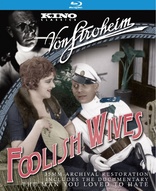Foolish Wives Blu-ray Movie
HomeFoolish Wives Blu-ray Movie 
Kino Lorber | 1922 | 143 min | Not rated | Jul 30, 2013Price
List price:Amazon: $18.58 (Save 47%)
Third party: $18.58 (Save 47%)
Only 2 left in stock (more on the way).
Movie rating
6.8 | / 10 |
Blu-ray rating
| Users | 0.0 | |
| Reviewer | 4.0 | |
| Overall | 4.0 |
Overview
Foolish Wives (1922)
"Count" Karanzim, a Don Juan is with his cousins in Monte Carlo, living from faked money and the money he gets from rich ladies, who are attracted but his charms and his title or his aristocratic behavior.
Starring: Mae Busch, Erich von Stroheim, Maude George, Miss DuPont, Rudolph ChristiansDirector: Erich von Stroheim
| Drama | 100% |
Specifications
Video
Video codec: MPEG-4 AVC
Video resolution: 1080p
Aspect ratio: 1.32:1
Original aspect ratio: 1.33:1
Audio
English: LPCM 2.0
Subtitles
None
Discs
50GB Blu-ray Disc
Single disc (1 BD)
Playback
Region free
Review
Rating summary
| Movie | 4.0 | |
| Video | 3.5 | |
| Audio | 4.5 | |
| Extras | 4.0 | |
| Overall | 4.0 |
Foolish Wives Blu-ray Movie Review
Appearance Versus Earnestness
Reviewed by Casey Broadwater August 30, 2013Austrian-American director/writer/actor Erich von Stroheim, one of silent cinema's most strident and stubborn auteurs, probably holds some kind of unfortunate record for having the most would-be masterpieces taken out of his hands and whittled down mercilessly by his studio overlords. (He bests even Orson Welles in this regard.) Insistent on building comprehensive worlds for his complicated characters to inhabit, Stroheim—who added the aristocratic "von" when he arrived at Ellis Island in 1909—shot miles of raw footage for his early films, assembling initial cuts that ran upwards of six hours. 1924's Greed, which might've been one of the grandest motion pictures ever made, was infamously hacked back from ten hours to two-and-a-half, an act made doubly tragic when a studio janitor destroyed everything that fell to the cutting room floor. Likewise, 1922's Foolish Wives, his third film—and what most cinema historians consider his earliest great work—was condensed to a nearly equivalent degree, from twenty-one reels to a paltry seven. In 1972, though, film historian Arthur Lennig culled through museum archives to create a partially reconstructed Foolish Wives that, at 143 minutes, is the most complete version we're ever likely to see, restoring menace and detail to Stroheim's epic melodrama of European hypocrisy and American earnestness.

The setting is Monte Carlo, "Europe's playground—irresponsible and gay as ever," immediately following the end of The Great War. Out on the coast in a rented villa, the rakish "Count" Vladislaw Sergius Karamzi—played with vampiric seductiveness by Stroheim himself—is whiling away the summer season with his two "cousins," Her Highness Olga Petchnikoff (Maude George) and Princess Vera (Mae Busch). On the surface, they appear to be posh aristocrats with time to waste and money to burn—the women are fashionably dressed, and Karamzi breakfasts on caviar with an oxblood chaser—but in reality, they're shady con-artists running scams laundering counterfeit bills in the city's high-end casinos and extorting cash from unsuspecting high society ladies.
To make their ruse more believable, they conspire to get into the good graces of bumbling American diplomat Mr. Hughes (Rudolph Christians) and his wife, Helen (Miss DuPont), who have newly arrived in Monaco and, as fish out of water, need a guide into the swift current that is European cultural etiquette. Karamzi, who has "a weakness for American women," sets about trying to lead Helen astray, separating her from her weak-willed and clueless husband in ways that don't rouse suspicion but still provide opportunity for his sly amorous advances. In a central sequence, he takes Helen out for a walk in the countryside—his "cousin," posing as chaperone, stays behind at the local inn—and intentionally gets them lost in a fierce storm, which forces them to take shelter in the cottage of an old hag. The whole time, we see Karamzi planning to make his romantic move—watch as he uses a pocket mirror to voyeuristically spy on Helen undressing—only to be foiled by the sudden interruption of a wandering priest also looking to get out of the rain. The holy man's appearance has the immediate effect of showing what a predatory devil Karamzi really is.
This is only one of many oppositions von Stroheim sets up; in another, he shows Karamzi in gleaming white military attire, which is practically an affront to the injured, amputated, and disheveled soldiers we see being pushed around Monte Carlo in wheelchairs. Elsewhere, Karamzi presents an appreciative face to the kindly old counterfeiter who keeps him supplied in fake cash, but then—behind his back—gives a lascivious once-over of the man's mentally retarded daughter, who will later fall prey to the count's ignoble urges. There's nothing honest about "His Excellency, Captain Count Vladislaw Sergius Karamzin," who embodies what von Stroheim saw as a uniquely European disingenuousness, a valuing of appearances over inner moral fortitude and authenticity. (Ironic, considering the director's self-appropriated sense of royalty. Maybe there's a bit of self-commentary going on here too.) In contrast, the what-you-see-is-what-you-get American, Mr. Hughes, may be unpolished and ignorant of upper-crust customs, but the almost goofy affection he has for his wife is infinitely more charming in its bald-faced, heart-on-the-sleeve openness. Inevitably, many American audiences misread this and assumed they were being made fun of for being unsophisticated, where von Stroheim was actually commenting on the hypocrisies of over-sophistication.
Foolish Wives was the most expensive Hollywood production to to date, with a massive Monte Carlo set built on a studio lot, a seaside promenade further up the California coast, and the staging of an elaborate and romantic water carnival. Like his mentor, D.W. Griffith, von Stroheim's had a need for a large-scale cinematic canvas, and this—combined with his perfectionism, over-budget expenditures, and unyielding will—eventually led the studio system to push him out of the director's chair by the early talkie era. In the later half of his career, he began taking acting roles as archetypal German baddies in films like Jean Renoir's The Grand Illusion and Billy Wilder's Sunset Boulevard, solidifying his reputation as "the man you love to hate."
Foolish Wives Blu-ray Movie, Video Quality 
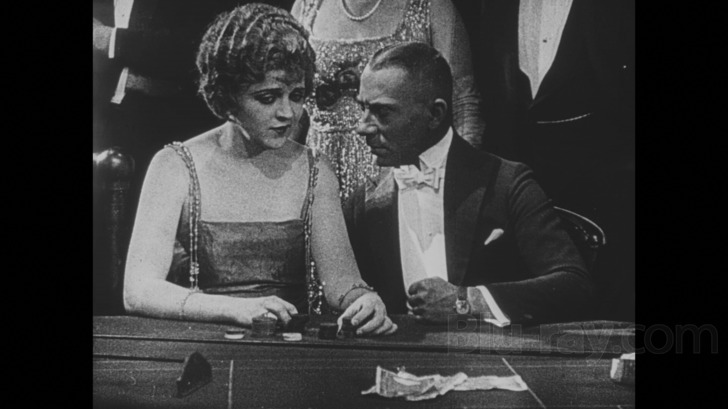
A disclaimer on the back of the Blu-ray case tempers expectations: "The American Film Institute restoration of Foolish Wives was reconstructed from multiple print sources, some of which survived in fragmentary and battered condition. While it is the most complete version of the film known to exist, it is below the standards of the typical archival Blu-ray release." Don't let that put you off, though. Yes, some of the film sources look decidedly rough, with blown out contrast and a lack of truly fine detail. Yes, there's a lot of age-related print damage in this 1080p/AVC-encoded transfer—flurries of white specks, jagged scratches, miscellaneous debris, dropped frames, brightness fluctuations, etc.—that runs near constantly from start to finish. But for a film that's over 90 years old, with sequences and scenes that were lost for much of that time and have only newly been pieced together, Foolish Wives looks better than might be expected. (It's a wonder we have this new version at all, so you'll hear no complaints from me.) It's clear that every effort was made to give this restoration a balanced, natural look—no grain-erasing noise reduction or harsh edge enhancement—and while it may not be up to the standards of a typical archival release, it's absolutely the best Foolish Wives has ever looked on home video.
Foolish Wives Blu-ray Movie, Audio Quality 
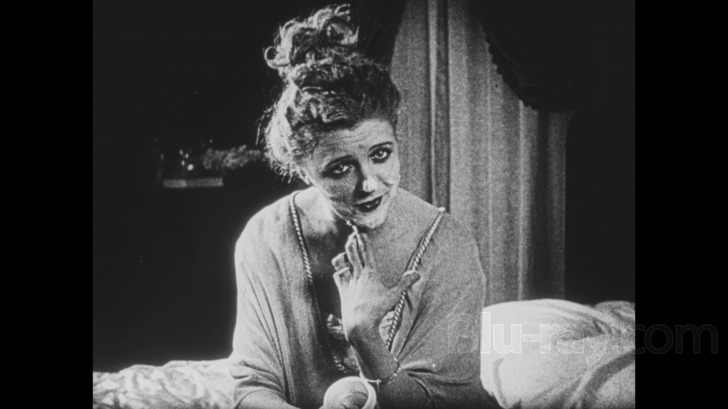
As with Kino's prior DVD release, the film is accompanied here by a new rendition of Austro-Hungarian composer Sigmund Romberg's original score, performed on piano by Rodney Sauer, founder of the Mont Alto Motion Picture Orchestra and an expert in the "photoplay music" of silent cinema. (You've heard his work on many other Kino releases.) Encoded as an uncompressed Linear PCM 2.0 stereo track, the music has satisfying clarity and presence, complementing the events on screen rather than overpowering them. No issues here.
Foolish Wives Blu-ray Movie, Special Features and Extras 
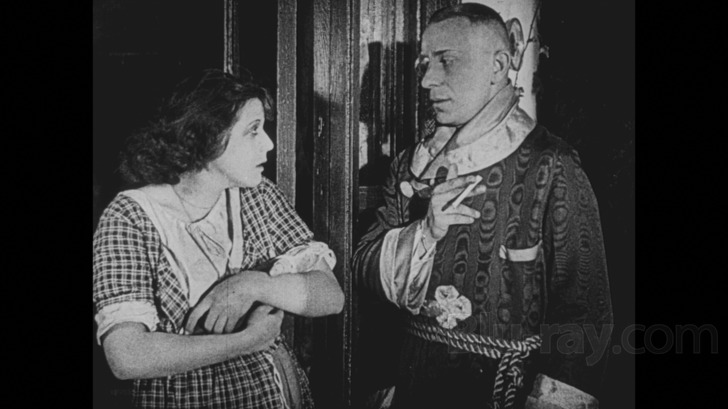
- Audio Commentary: Von Stroheim biographer Richard Koszarski delivers an illuminating commentary that picks up on small directorial details it would otherwise take several viewings to catch. An engaging listen.
- The Man You Loved to Hate (HD, 1:30:08): This is one of the best bonus features I've seen on the release of a classic film this year. Patrick Montgomery's The Man You Loved to Hate is a 1979 documentary/retrospective that covers the breadth of von Stroheim's life and career, featuring clips from his films and acting appearances and interviews with producers, cinematographers, screenwriters, and those who knew him best. A must-watch for silent film lovers.
- Audio Interview Clips: Includes additional audio-only interviews with von Stroheim producer/agent Paul Kohner (5:06) and wife Valerie von Stroheim (4:58), taken from The Man You Loved to Hate research materials.
- New York Censor Board Cuts (HD, 3:45): A montage of scenes/shots required to be cut when the film was first reviewed by the New York Censor Board.
- Photo Gallery (HD): A user-directed gallery with 32 stills and promo images.
Foolish Wives Blu-ray Movie, Overall Score and Recommendation 
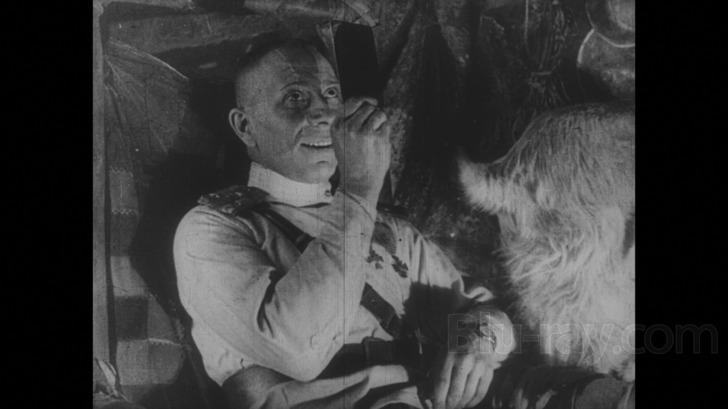
Erich von Stroheim's Foolish Wives—advertised as Hollywood's first "million-dollar movie"—is a large-scale melodrama that, in 1922, was the most expensive film yet made. (Stroheim took after his mentor, D.W. Griffith, in more ways than one.) It also stirred up a controversy as big as its budget, garnering ill-founded accusations of anti-Americanism. If anything, the movie is more of an indictment of the sham civility of Europeans after the Great War; it may portray Americans as bumbling and uneducated when it comes to high-society etiquette, but it also lauds their honesty and authenticity. For decades, the film was only seen in a heavily truncated cut, but Kino's Blu-ray release—sourced from the American Film Institute's 1972 restoration—adds back much, though not all, of the missing material. It's probably the most complete version we'll ever see. Highly recommended for all who appreciate silent cinema.
Similar titles
Similar titles you might also like

Mistress America
2015

A Master Builder
2013

The Reluctant Fundamentalist
2013

Husbands
1970

This Happy Breed
1944

My Blueberry Nights
2007

Havana
1990

The Farewell
2019

Wake in Fright
1971

The Irishman
2019

A Dangerous Method
2011

First Cow
2019

The Men
Battle Stripe
1950

Way Down East
1920

Hamlet
1948

Clouds of Sils Maria
2014

The Killing of a Chinese Bookie
1976 and 1978 Versions
1976

Sherlock Holmes
1922

In Dubious Battle
2016

Black Narcissus
1947
